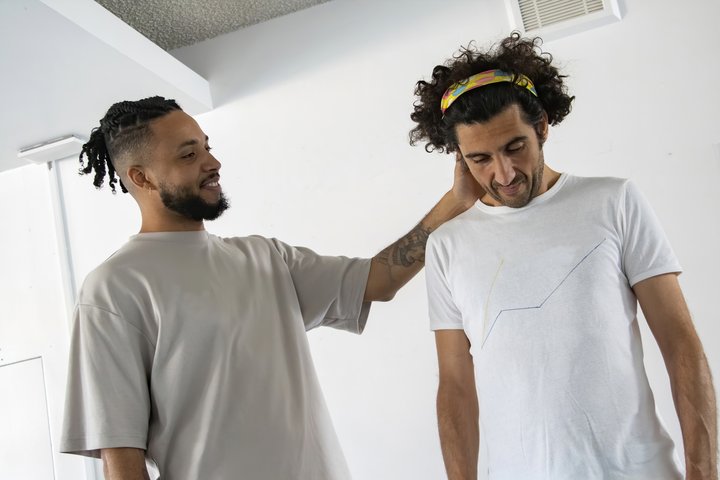Spotlight on: Meisner
Our short course in Meisner technique introduces students to a unique training form that teaches actors to respond to stimuli and develop observation and active listening.
We caught up with course director Ian Henderson to learn more about Sanford Meisner, the six-week course and what Meisner technique can do for actors.

Who was Sanford Meisner?
Sanford Meisner was an actor and teacher. He was one of the co-founders – alongside other practitioners like Stella Adler and Lee Strasberg – of The Group Theatre, an acting company that changed American acting and theatre practice in the early 20th century. Meisner started teaching at New York’s Neighbourhood Playhouse, and his classes focused on finding this human connection between two people. We take this connection as a given, but it actually takes a surprising amount of work.
What is Meisner technique?
Meisner developed a set of exercises to help actors to communicate more truthfully with one another. These were centred around three core principles: emotional preparation, repetition, and improvisation. Now communication seems like a very basic thing for an actor – or indeed a human being – to do. But it's interesting how the theatricality of acting often wasn't connected on that basic, human level – and really, that’s what keeps us coming back to the theatre or the cinema. So Meisner developed these ways of working which helped actors really access this communication in a non-verbal way, even when using dialogue, and discover ways of communicating with each other on a much deeper level.
Meisner was really keen on keeping human contact, and a kind of truthfulness based on really feeling something, rather than searching for an emotion you’re directed to have. It’s about discovering those emotions through the work, rather than analysing everything in an intellectual way; it’s much more of a complete and visceral experience, in that the mind and the body are working together. Sometimes people find it quite intimidating, because they find that they reach a level of vulnerability and openness which can be challenging. But what I love about the work is that it isn't based on going to an extreme emotion – it can actually be just having a very straightforward, honest reaction to something quite simple. It doesn't have to be massive or especially profound, it just has to be connected. Meisner technique becomes a very simple route into exploring the art of human behaviour.
Tell us about the course. What will students learn?
Meisner himself said it takes 20 years to learn how to become an actor. And so this six week course is the beginning of your journey in this way of working. We’ll be working on Meisner exercises, including improvisation and repetition, looking at ways of working with text and exploring voice and movement. You’ll learn to become aware of when you’re connecting with someone, finding your own truthfulness barometer which is incredibly valuable. You can begin to identify when you are or aren’t ‘in’ the scene and connected. It’s intense, and you can at times feel very emotionally open, but ultimately that’s something you need to be able to access as an artist. You can’t be closed off!
What can Meisner technique do for actors?
I think where this technique can be really helpful is that actors learn that they don't need to be reaching for big emotions. It just becomes a way of working, to explore this idea of nonverbal communication. Meisner technique helps an actor go from showing an audience that they’re somewhere or doing something, to really doing it; living truthfully in a given set of circumstances, and finding the freedom in that. Not what you think is the truthful way, or what a director thinks is the truthful way. You start to become much more aware of when you really are connected to someone, because you’re focused on what’s outside of you, what’s affecting you, and how you respond to that. You start to learn how you behave truthfully, and from there you can then grow a character by adding in everything else that you learn. But there's got to be truthfulness and a connection to humanity, because it can make a world a lot more real, whether it’s very naturalistic or a fantasy like Game of Thrones. The technique will allow you to go there and support the connection of truth.
What’s your favourite Meisner exercise?
The repetition exercises are the beginning and help people to become aware of something outside of themselves. I think when people start to do these exercises they discover how the simplicity of just existing is extremely interesting, and they grow from that. Those very early exercises are when people just start to realise how simple this technique is, how it's about allowing yourself to be open and vulnerable. Intellectually it's hard, but when you start to make those connections the body starts to relax and you start to just experience things. I love those very early moments where people start to realise, ’oh, this is actually quite easy’, because they're not thinking, they're just allowing themselves to be affected by something. There is a rigor to the work, but it’s simple. And while being simple can be very difficult, the simplicity of just existing is extremely interesting.
Apply now
Meisner runs Monday – Friday, in-person at RADA from 21 October– 29 November 2024 . Apply now.
